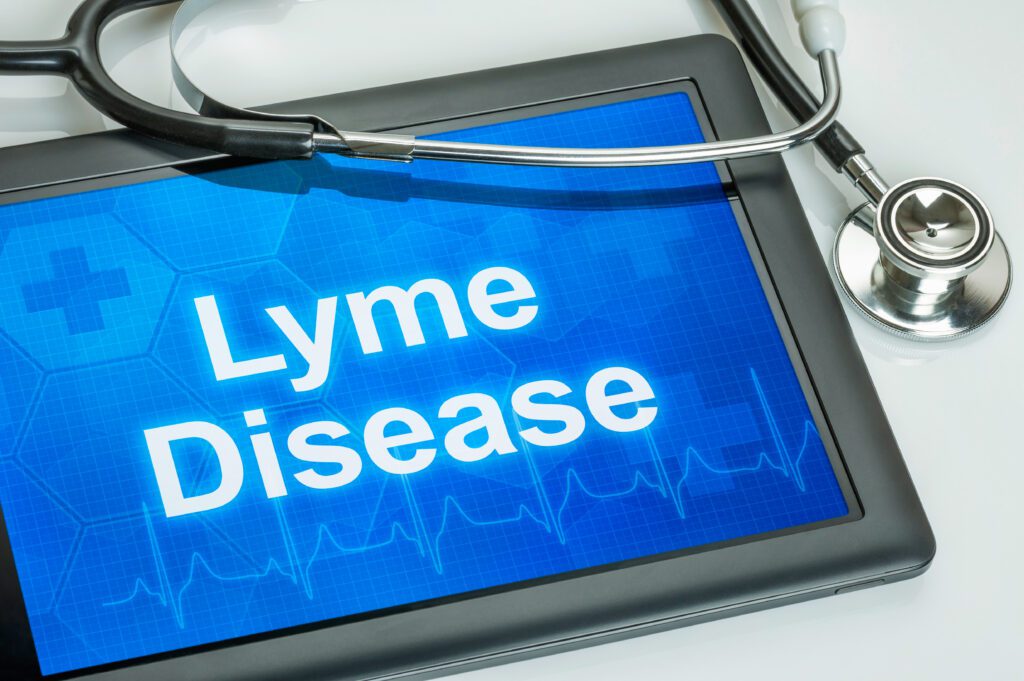Lyme disease is a growing concern not only because of the physical problems it causes, but also its connection to anxiety and depression. Caused by borrelia bacteria, people usually get Lyme disease from the bite of a tick carrying the bacteria.

The symptoms of Lyme disease vary, but they usually show up in three possible stages. The first stage happens within three to 30 days after a tick bite and presents with a rash. The rash usually appears as a single circle that spreads from the site of the tick bite. It may resemble a bullseye and be warm to the touch; however, it is not typically painful or itchy.
Additional symptoms can include fever, headache, extreme tiredness, joint stiffness, muscle aches and pains, and swollen lymph nodes.
If untreated, Lyme disease can worsen. Stage two symptoms present within three to 10 weeks after a tick bite and are more serious. Patients may notice additional rashes on other parts of their body, neck pain or stiffness, muscle weakness on one or both sides of their face, immune-system activity in heart tissue that causes irregular heartbeats, pain that starts from the back and hips and spreads to the legs, numbness or weakness in the hands or feet, painful swelling in tissues of the eye or eyelid, or immune-system activity in eye nerves that causes pain or vision loss.
If Lyme disease progresses to the third stage – two to 12 months after a tick bite — patients often notice arthritis in large joints.
The first-line treatment for Lyme disease is antibiotics. The sooner treatment begins, the quicker and more complete the recovery.
Antibiotics are usually given as a pill for 10 to 14 days, although it could be longer depending on the symptoms. A doctor could also prescribe an intravenous (IV) antibiotic for more serious cases.
According to the Mayo Clinic, antibiotics are the only proven treatment for Lyme disease. Other treatments have not been shown to work or have not been clinically tested.
According to Psychology Today, Lyme disease can mimic psychiatric disorders and increase the severity of prior psychiatric symptoms. Some doctors report cases of patients who score high on standardized tests for depression and anxiety returning to near-normal scores when their Lyme disease and co-infections are successfully treated.
A study reported in The American Journal of Psychiatry links Lyme disease to an elevated risk of psychiatric illness. The study, conducted by Dr. Michael Eriksen Benros of Copenhagen University Hospital and Dr. Brian Fallon of Columbia University, found that a diagnosis of Lyme disease can increase the risk of any mental disorder, including depression, by 24%.
With two or more episodes of Lyme disease, that risk increases to 79%. The elevated risk of mental disorders was highest in people ages 20-29.

If you suffer from Lyme disease and anxiety or depression, talk to your healthcare provider about how they may be connected. Treatment for Lyme disease is critical, and psychiatric symptoms should not be ignored.
Additional resources for Lyme disease:
Lyme disease – Diagnosis and treatment – Mayo Clinic
Lyme Disease | Lyme Disease | CDC
LymeDisease.org – Advocating nationally for quality accessible healthcare for patients with Lyme disease
Lyme Action Network – Information, News & Resources on Lyme Disease